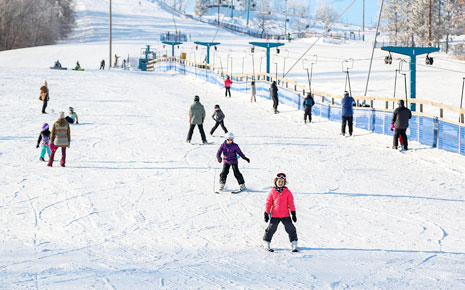Hitting the slopes: How winter recreation powers Minnesota's rural economy

12 Nov 2025
When temperatures drop, Minnesota's economy heats up. Snow-based recreation generated $238 million in state economic value in 2023, a dramatic rise of $126 million since 2019, according to the Bureau of Economic Analysis. While many tourism sectors declined during the pandemic, skiing and snowboarding activity increased. Even when travel slowed, Minnesotans kept their skis on the snow and their dollars in motion.
Winter activities ripple through the economy far beyond the slopes. Spending on lodging ($939 million), shopping ($446 million), and cold-weather apparel ($1.4 billion) illustrates how outdoor recreation sustains year-round business for local retailers, hotels, and restaurants. Together, these industries strengthen the state's broader recreation economy, which supported 320,000 jobs and $10.9 billion in payroll in 2023.
Ski industry employment climbs toward stability
Minnesota's 23 ski facilities employed 2,406 workers and generated nearly $9.5 million in payroll during the first quarter of 2024. While job counts have varied over the past decade, the long-term trend in wage growth is striking. Average weekly pay in ski-related industries has increased by 58% over the past 10 years, signaling higher competition for skilled workers and longer hours during peak seasons.
This wage growth represents an industry adapting to modern labor and energy challenges. Even as winter weather grows less predictable, Minnesota's ski economy remains a steady force in rural economic development, supported in large part by Great River Energy's member-owner cooperatives.
Behind the scenes, reliable energy infrastructure keeps the lifts turning and the snow guns running. Great River Energy's member-owner cooperatives, including Runestone Electric Association, Meeker Energy, and East Central Energy, play a critical role in powering this winter economy.
Reliable energy keeps rural tourism in motion
Ski areas are among the most energy-intensive tourism assets in Minnesota. Resorts depend on constant power to operate snowmaking equipment, chairlifts, heating systems, and lodges. A single day of downtime during peak season can have wide economic consequences.
The member-owner cooperatives of Great River Energy understand these stakes. They combine infrastructure investment with energy efficiency programs that help resorts manage costs and maintain reliability, even during sub-zero cold snaps.
Runestone Electric Association supports Andes Tower Hills and rural tourism growth
In west-central Minnesota, Runestone Electric Association serves a region defined by lakes, trails, and tourism. Among its members is Andes Tower Hills, one of the area's signature ski destinations. The resort often faces challenges from ice storms and strong winds.
Runestone Electric has invested in grid hardening and system upgrades, including replacing overhead lines with underground cable and improving backfeeding capacity. These improvements help ensure consistent service even during winter storms. By reducing outage risk, Runestone Electric protects Andes Tower Hills' operations and the broader local economy that depends on winter visitors.
Strategic programs for operational efficiency
Andes Tower Hills has benefited from Runestone Electric's commercial rebate and rate programs, which help the resort manage energy usage and invest in upgrades that improve efficiency. Programs like these align local energy reliability with long-term economic sustainability..
These investments also help the resort offset seasonal fluctuations in revenue. By reducing ongoing utility costs, Runestone Electric's programs enable ski operations to maintain quality service and stable employment throughout the season.
Community engagement beyond energy
Runestone Electric's role extends beyond power delivery. The cooperative actively highlights local tourism and small businesses through its Member Business Tours, Advisory Council meetings, and member engagement programs. These initiatives create connections among business owners, residents, and cooperative leaders to highlight the local tourism network that supports winter recreation assets.
Building a broader tourism economy
The Andes Tower Hills resort and surrounding area include other attractions like Arrowwood Resort, Carlos Creek Winery, and family-friendly agritourism destinations. Runestone Electric's infrastructure improvements and cooperative programs indirectly support these enterprises by keeping the region powered, accessible, and economically vibrant year-round.
Meeker Energy: Powering Powder Ridge and local partnerships
Energy management for a demanding winter operation
Meeker Energy serves Powder Ridge near Kimball, a resort that embodies both the excitement and the economic importance of winter recreation. Powder Ridge participates in Meeker Energy's Large Power Curtailable Program, voluntarily curtailing snowmaking operations during peak demand periods.
This demand-response partnership benefits both the cooperative and the resort. Meeker Energy gains flexibility to balance the grid during high-load events, while Powder Ridge lowers its energy costs and contributes to overall system stability.
Long-term efficiency improvements
Over the years, Powder Ridge has invested in high-efficiency compressed air systems for snowmaking, reducing its peak winter demand and improving sustainability. These improvements demonstrate how energy efficiency and operational performance go hand in hand.
Meeker Energy's technical support and rebate programs help resorts adopt these innovations. Each improvement reduces strain on the local grid while ensuring that businesses remain competitive and resilient, especially as weather patterns shift.
Building community through recreation
For Meeker Energy, winter recreation is a community gathering point. The cooperative has hosted annual member appreciation events at Powder Ridge for more than a decade, drawing hundreds of attendees. These events increase member engagement and showcase how the cooperative's service extends beyond electricity to community connection.
Promoting rural exchange and tradition
For more than 30 years, Meeker Energy has sponsored the annual day of skiing for the Peanut Butter & Milk Festival, a cultural exchange between Litchfield, Minnesota, and Hartford, Alabama Future Farmers of America (FFA) Chapters. Through this partnership, young people explore the agricultural and cultural ties between regions, often finished by a community day of skiing at Powder Ridge. The event highlights how Meeker Energy integrates education, agriculture, recreation, and partnership into its mission of cooperative service.
East Central Energy: Keeping Mont du Lac powered through peak season
Engineering for reliability in harsh conditions
In the rolling hills of northeastern Minnesota, East Central Energy powers Mont du Lac, a ski resort that doubles as a four-season recreation destination. Ski resorts like Mont du Lac operate at peak capacity during winter, requiring high energy for snowmaking compressors, lifts, heating, and hospitality services.
East Central Energy has modernized the resort's infrastructure by converting overhead lines to underground lines and increasing conductor size to handle heavier loads. These upgrades ensure stable voltage and protect the system from damage caused by wind and ice.
Using real-time data to minimize disruptions
East Central Energy's real-time monitoring technology detects outages and voltage fluctuations in real time, allowing teams to respond quickly before they disrupt resort operations. During busy weekends, this level of reliability is critical to ensuring guest safety and supporting the region's economic performance.
Supporting efficiency and cost control
Mont du Lac has also benefited from East Central Energy rebate programs after installing more energy-efficient systems. These upgrades lower operating costs and demonstrate how the cooperative model promotes sustainability while maintaining profitability.
Tourism as a year-round economic driver
The resort's continued success has ripple effects for local restaurants, lodging providers, and retail businesses. As one of the area's anchor attractions, Mont du Lac draws visitors who support dozens of other small businesses in the region. East Central Energy's infrastructure investments protect this economic ecosystem and ensure that winter tourism remains a dependable contributor to northeastern Minnesota's economy.
Cooperative power drives rural Minnesota's winter economic engine
Each ski run, tubing hill, and snow-covered slope across Minnesota reflects a deeper economic truth: rural tourism depends on reliable, local power. Great River Energy's member-owner cooperatives provide that foundation. Their work ensures that seasonal industries, especially ski resorts, can adapt and continue to deliver measurable value to their locals and visitors.
Winter may bring cold temperatures, but it also brings economic warmth to Minnesota's rural regions. And behind that success, Great River Energy's member-owner cooperatives' power keeps every lift running, every snow gun humming, and every local business open for the season.
Head for the chills
Great River Energy and its member-owner cooperatives continue to support rural Minnesota's year-round recreation economy. Visit https://econdev.greatriverenergy.com/ to read more stories about the member-owner cooperative's impact on rural growth.
More Topics




